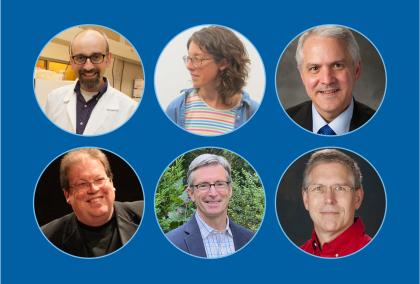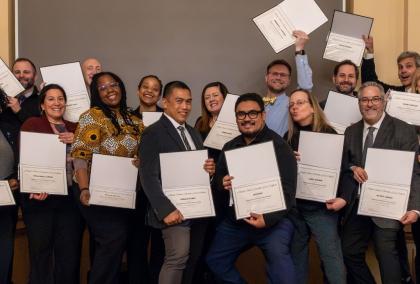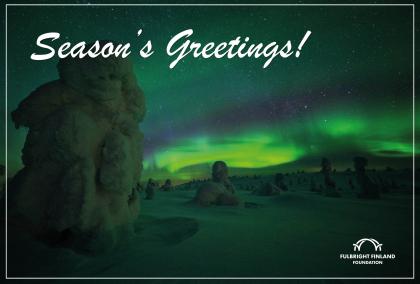Learning Objectives of the Module:
- To get acquainted with the unique features of the Fulbright Finland Foundation as a private Finnish non-profit organization so as to be able to talk knowledgeably about the Foundation and its mission and programs both in Finland and in the United States.
- To learn the key facts about the global Fulbright Program with over 160 participating countries, and to understand how this provides all of the Foundation’s grantees (both Fulbright grantees as well as those grantees participating in the Foundation’s other programs) a direct access to the Foundation’s worldwide collaboration and alumni network.
- To become familiar with some of the key concepts related to the Foundation's programs, such as citizen diplomacy, science diplomacy, knowledge diplomacy, cultural diplomacy, and public diplomacy.
- To begin to think about and shape your own role as a grantee and citizen diplomat.
Pre-assignments:
1. Learn about the Fulbright Finland Foundation
The Fulbright Finland Foundation is a private not-for-profit organization registered under Finnish law. As an independent foundation, it provides a unique platform for a large number of programs between Finland and the United States. Please note that among those, there are both Fulbright programs as well as awards operating outside of Fulbright. All of these programs are equally important.
When you applied for your grant program and prepared for your interview, you went through carefully the Fulbright Finland Foundation's website, and you already know about the Foundation's vision, mission, and brand promise. Now it is time to learn more:
- Listen to this Yle Radio 1 program about Fulbright Finland Foundation’s past and present (40 mins)
- Check out the Year in Focus page (reading time 3 mins)
- Read the History Unlike Any Other (reading time 4 mins)
2. Learn about the Fulbright Finland Foundation's Global Network
Over 160 countries participate in the global Fulbright Program with the United States. The fact that the Fulbright Finland Foundation is a part of this global network provides all of the Foundation’s grantees – both Fulbright grantees as well as grantees in the Foundation’s other programs – a direct access to the Foundation’s worldwide collaboration and alumni network. Learn more about the global Fulbright program:
- Watch the remarks by the Foundation’s CEO Terhi Mölsä addressing “The Global Fulbright Program at 75: Current Challenges and Opportunities”. (Opening Plenary of the 44th Annual Conference of the U.S. Fulbright Association, October 2021.) (13 mins)
- Players in the Fulbright Community (reading time 1 min)
- Read a brief description of the Fulbright program in the SAGE Encyclopedia of Higher Education (2020) (reading time 2 mins)
3. Begin to design your own role as a Fulbright Finland Foundation grantee
All of the Foundation’s programs are leadership programs. In this context, “leadership” does not refer to rank or titles, but rather to a conscious decision to take responsibility to create meaningful change – a decision that does not depend on age, background, field, or a specific grant program.
- For a discussion on “leadership” and how it is understood in the context of the Fulbright Finland Foundation, please read the following interview: "Seeking Solutions for Global Challenges" (Fulbright Finland News 1/2020) (reading time 5 mins)
All Foundation grantees are citizen diplomats. It is up to each grantee to decide what that role will look like in practice. It will likely be different, for instance, for a senior researcher than to a young undergraduate, or a professional. But all are equally important.
As a grantee, you are not an official representative of your government. As a citizen diplomat, you serve as a cultural ambassador, sharing your own, individual cultural background, characteristics, and thoughts.
- Reflect on your personality, preferences, and strengths, and start to think about how you wish to shape the role for you so that it feels comfortable and empowering.
To help you design your own role, it is important to understand the different dimensions and emphasis that it can take. For this reason, take some time to become familiar with some key concepts, such as science diplomacy, knowledge diplomacy, cultural diplomacy, and public diplomacy, just to mention a few.
- Read article "Citizens and Science Diplomacy" (Fulbright Finland News 1/2021) (reading time 3 mins)
- For a brief introduction to Science Diplomacy, watch "What Is Science Diplomacy for Addressing Global Challenges?" on YouTube (3 mins 20 sec).
- Science Diplomacy & ‘Together Shaping the Future is an article by Dr. Anita Wagner (2022-23 Fulbright-Tampere University Scholar Award) reflecting on how she shaped her own role in Science Diplomacy as a Fulbright scholar in Finland (reading time 5 mins).
4. Optional: If you have time and you are interested in learning more, please consider viewing the following additional resources:
- For a brief discussion on knowledge diplomacy and how it differs from the unilateral “soft power” approach, read "Knowledge Diplomacy vs. Soft Power" by Dr. Jane Knight, International higher education researcher and Fulbright alumna (reading time 5 mins).
- Science Diplomacy in the European framework
- Pages 6-13 of the policy report for British Council on knowledge diplomacy compiled by Dr. Jane Knight, International higher education researcher and Fulbright alumna.
- Reputational Security: Refocusing Public Diplomacy for a Dangerous World. Webinar by the PDCA (Public Diplomacy Council of America) featuring Professor Nicholas J. Cull as the speaker. (viewing time 56 minutes)
- The Fulbright Paradox (Foreign Affairs, July/August 2021)
- The Fulbright Program Is Quietly Burying Its History (Karin Fischer, The Chronicle of Higher Education, December 8, 2023)
TASK:
Think about your own role as a grantee and citizen diplomat. What would you like that role to look like? Come to the joint session with your own reflections and thoughts and be prepared to share them with others.
Please share your questions and thoughts on this Whiteboard in advance before the orientation day (you can do it anonymously). It may help the others in their thinking process as well. Please include your comments and questions in the Whiteboard by May 8, 2025.
Please note that these pages are for the Fulbright Finland Foundation grantees only and not to be shared publicly.


